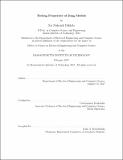Testing properties of Ising models
Author(s)
Dikkala, Sai Nishanth
DownloadFull printable version (783.9Kb)
Other Contributors
Massachusetts Institute of Technology. Department of Electrical Engineering and Computer Science.
Advisor
Constantinos Daskalakis.
Terms of use
Metadata
Show full item recordAbstract
Given samples from an unknown multivariate distribution p, is it possible to distinguish whether p is the product of its marginals versus p being [epsilon]-far from every product distribution? Similarly, is it possible to distinguish whether p equals a given distribution q versus p and q being [epsilon]-far from each other? These problems of testing independence and goodness-of- fit have received enormous attention in statistics, information theory, and theoretical computer science, with sample-optimal algorithms known in several interesting regimes of parameters [14, 15, 17, 18, 20]. Unfortunately, it has also been understood that these problems become intractable in large dimensions, necessitating exponential sample complexity. Motivated by the exponential lower bounds for general distributions as well as the ubiquity of Markov Random Fields (MRFs) in the modeling of high-dimensional distributions, we study distribution testing on structured multivariate distributions, and in particular the prototypical example of MRFs: the Ising Model. We demonstrate that, in this structured setting, we can avoid the curse of dimensionality, obtaining sample and time efficient testers for independence and goodness-of-fit which yield a sample complexity of poly(n)=[epsilon]2 on n-node Ising models. Along the way, we develop new tools for establishing concentration of functions of the Ising model, using the exchangeable pairs framework developed by Chatterjee [27], and improving upon this framework. In particular, we prove tighter concentration results for multi-linear functions of the Ising model in the high-temperature regime. We also prove a lower bound of n=[epsilon] on the sample complexity required for testing uniformity and independence of n-node Ising models.
Description
Thesis: S.M., Massachusetts Institute of Technology, Department of Electrical Engineering and Computer Science, 2017. This electronic version was submitted by the student author. The certified thesis is available in the Institute Archives and Special Collections. Cataloged from student-submitted PDF version of thesis. Includes bibliographical references (pages 99-102).
Date issued
2017Department
Massachusetts Institute of Technology. Department of Electrical Engineering and Computer SciencePublisher
Massachusetts Institute of Technology
Keywords
Electrical Engineering and Computer Science.